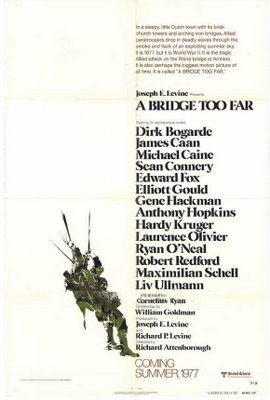 Cast: Dirk Bogarde (Lieutenant General Browning), James Caan (Staff Sergeant Dohun), Michael Caine (Lieutenant Colonel J O E Vandeleur), Sean Connery (Major General Urquhart), Edward Fox (Lieutenant General Horrocks), Elliott Gould (Colonel Stout), Gene Hackman (Major General Sosabowski), Anthony Hopkins (Lieutenant Colonel Frost), Hardy Kruger (Major General Ludwig), Laurence Olivier (Doctor Spaander), Ryan O’Neal (Brigadier General Gavin), Robert Redford (Major Cook), Maximilian Schell (Lieutenant General Bittrich), Liv Ullman (Kate Ter Horst).
Cast: Dirk Bogarde (Lieutenant General Browning), James Caan (Staff Sergeant Dohun), Michael Caine (Lieutenant Colonel J O E Vandeleur), Sean Connery (Major General Urquhart), Edward Fox (Lieutenant General Horrocks), Elliott Gould (Colonel Stout), Gene Hackman (Major General Sosabowski), Anthony Hopkins (Lieutenant Colonel Frost), Hardy Kruger (Major General Ludwig), Laurence Olivier (Doctor Spaander), Ryan O’Neal (Brigadier General Gavin), Robert Redford (Major Cook), Maximilian Schell (Lieutenant General Bittrich), Liv Ullman (Kate Ter Horst).Crew: Richard Attenborough (director), Joseph E Levine and Richard P Levine (producers), William Goldman (writer), John Addison (music), Geoffrey Unsworth (cinematography), Antony Gibbs (editor), Terence March (production designer).
Synopsis: In a bid to end the Second World War in Europe by Christmas 1944, the Allies launch Operation Market Garden. Thirty-five thousand troops are dropped behind enemy lines in Holland with orders to take and hold a series of vital bridges. Meanwhile ground forces are ordered to smash through the German forces and link up with the paratroopers, travelling sixty-three miles in just two days. The goal is to secure Arnhem Bridge, giving the Allies direct access to the heartland of Germany. But weather conditions, technical problems and tactical errors bedevil the operation. It takes the ground troops nine days instead of two to reach Arnhem and the armoured advance fails one mile short of the bridge. The Allies are forced to pull back…
+++++++++++++++++++++++++++
Operation Market Garden was one of the Second World War’s most heroic failures. It was the largest airborne operation ever mounted and cost the lives of thousands of soldiers. Cornelius Ryan turned these events into an international bestseller, A Bridge Too Far, first published in 1974. Film rights were optioned by independent producer Joseph E Levine, who came out of retirement for this project. Levine had helped make such diverse movies as Zulu (1964), The Graduate (1967), and Carnal Knowledge (1971).
A Bridge Too Far was a massive endeavour, with a cast of thousands and fourteen major actors in starring roles. It was reportedly the most expensive British production ever made at the time, with a budget estimated between $22 million and $45 million. To finance the project, Levine hired a superstar cast to pre-sell the film to distributors world-wide. The producer paid his stars a flat fee of $500,000 to $1 million a week each.
Britain actor-director Richard Attenborough was chosen to helm the picture, while Oscar-winning scribe William Goldman turned the sprawling epic into a three-hour screenplay. (There is a fascinating chapter about the production in Goldman’s seminal book, Adventures in the Screen Trade.) Filming took place over six months on location in Holland and England, with interiors at Twickenham Studios. Despite the massive scope of the project, it finished on schedule and under budget.
Caine was one of the fourteen actors hired to fill the starring roles. He played Lieutenant Colonel J O E Vandeleur, leading the armoured ground forces on their charge towards Arnhem. Caine arrived on location only two days after finishing after another WWII film, The Eagle Has Landed (1976). But while that picture purported to have some basis in fact, A Bridge Too Far was firmly reality-based. Caine sought advice from the real Vandeleur, who was a technical advisor on set. The veteran was full of praise for his film incarnation. ‘Michael Caine was first class,’ Vandeleur told the Daily Express. ‘I think it will be a marvellous film. Dickie Attenborough is a great director.’
The picture was released on June 15 1977 across America, rated PG. The MPAA had initially branded it an R but this was changed after an appeal by Levine. The film grossed more than $50 million in the US, but received mixed reviews. American critics found elements of the story unbelievable, despite the factual source material. The British release followed a week later, with the BBFC requiring cuts before granting an A rating. UK reviewers were also unsympathetic, some paying as much attention to the cost of the film as to the content. Despite this A Bridge Too Far was nominated for eight BAFTA awards in 1978 and won four – best supporting actor (Fox), music, soundtrack and cinematography. The film was first released on video in 1986 and remains available, rated 15. A DVD edition followed in 2001 with a two-disc special edition in 2003.
Reviews: ‘When celluloid death is so random and so spectacular, so mechanised and so grotesque … then it is impossible not to fill the screen, intermittently, with pictures which stun the mind and bruise the conscience.’ – Sunday Times
‘So wearily, expensively predictable that by the end the viewer will in all likelihood be too enervated to notice Attenborough’s prosaic moral epilogue.’ – MFB
Verdict: Like Battle of Britain, this film is a Second World War epic based on real events, encrusted with big name actors in small roles. But A Bridge Too Far is the more successful of the pair, keeping its focus on the war and not getting diverted by attempts at human interest. This is a accomplished feat of filmmaking by Attenborough, with stunning imagery and a stirring score. Goldman’s screenplay succeeds in making such a sprawling event easy to follow, while familiar faces helps the viewer keep track of who’s who. Caine’s role is relatively minor and mainly involves sitting atop an armoured vehicle. This film is superior to Battle of Britain, but the failure of Operation Market Garden necessitates a downbeat ending that may leave you unsatisfied.
No comments:
Post a Comment